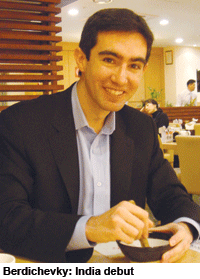 An alumnus of Harvard and Stanford universities, Daniel Berdichevky is the founder chief executive of DemiDec Resources, a corporate which provides study materials for the United States Academic Decathlon (an annual high school academic competition), and has been hosting the annual World Scholar’s Cup since 2007. Berdichevky and his team were in Delhi last Dece-mber to launch the latter tournament in India.
An alumnus of Harvard and Stanford universities, Daniel Berdichevky is the founder chief executive of DemiDec Resources, a corporate which provides study materials for the United States Academic Decathlon (an annual high school academic competition), and has been hosting the annual World Scholar’s Cup since 2007. Berdichevky and his team were in Delhi last Dece-mber to launch the latter tournament in India.
Newspeg. The World Scholar’s Cup (WSC) made its debut in India on December 17-18 in Delhi, by staging its first-ever local round which attracted participation of 450 students from 50 schools in the national capital region. The Heritage School, Rohini (Delhi) won the inaugural tournament in the senior and junior divisions. This year a series of city-specific rounds leading to the all-India finals in December 2013 has been planned by WSC organisers.
World Scholar’s Cup. The WSC tournament tests the collaborative and exploratory learning skills of secondary and higher secondary students in the age group 11-18. It comprises four competitive activities — debate, writing, challenge, and scholar’s bowl. In keeping with the annual tradition of selecting a new idea or theme, the motif of the inaugural WSC India is ‘A World in Motion’. In the junior (11-15 years) and senior divisions (15-18 years), teams comprising three students will face-off in each activity.
Genesis. An enthusiastic participant in the US Academic Decathlon (estb.1981) since he was a high school student, after completing his Masters in 2005 at Harvard, Berdichevky enroled for a lecture tour organised by Harvard alumni for middle school students in South Korea. At the end of the tour, he became acutely aware that Korean students were too exam focused. He persuaded the organisers to allow him to form teams of students and stage a tournament on the lines of the US Academic Decathlon. After a round of a stimulating co-curricular competition, the Korean students asked for a re-match. “That’s when I realised that schools need exciting competitions like Scholar’s Cup,’’ recalls Berdichevky. Since then, the WSC annual event has spread to 40 countries and been staged in four countries since 2007.
Direct talk. “The WSC event brings students around the world together for exploring, skilling and bonding on big themes through collaborative learning, team building, public speaking and talent showcasing. It’s a student-centric learning model under which students teach each other, interact, work in teams and develop confidence. The tourn-ament provides them opportunities to think about the future of the world they live in. At the end of each national and regional round, participants become aware of how much they have in common. This bonding creates border-less communities of learners,’’ says Berdichevky.
Future plans. With the annual WSC striking root in 40 countries, Berdichevky is charting plans to plant its flag in every continent. “By staging WSC tourn-aments around the world, we have created communities of scholars who have formed networks to expand its outreach under our World Scholars Ambassador programme. In the future, we hope schools will integrate the WSC model into their educational curriculums, as most of them are still following obsolete pedagogies. Already schools in Thailand, Malaysia and even USA have taken a cue from our joyful learning programme. This is a positive development and good news for students,’’ says Berdichevky.
Way to go, Bro!
Autar Nehru (Delhi)